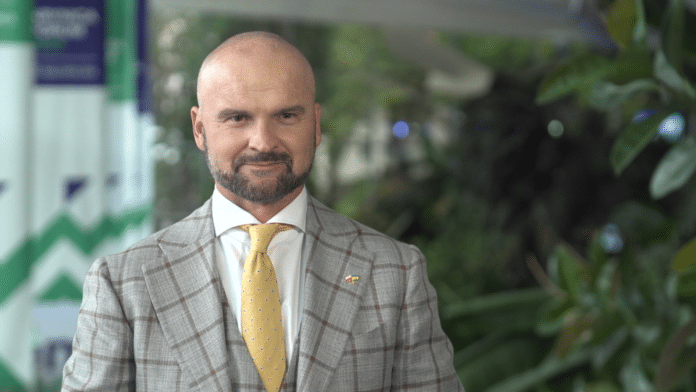The courier industry is heavily investing in green delivery methods. One such effort is the electrification of delivery vehicle fleets, which are becoming more common on Polish roads, albeit not as fast as desired. Another focus is on deliveries to collection points and parcel lockers. As pointed out by InPost, a courier can deliver ten times more parcels to these hubs in the same amount of time compared to home deliveries. This leads to less traffic congestion and reduced emissions. Soon, those sending and receiving parcels at InPost lockers will be able to check the carbon footprint of each transaction in the app, and see how it compares to other delivery methods.
“E-commerce is becoming increasingly green,” says Rafał Brzoska, CEO and founder of InPost, in an interview with Newseria Biznes. “The company I run currently has the greenest profile of any delivered parcel, because each parcel delivered to an InPost locker saves 97% of CO2 emissions compared to a parcel delivered traditionally to a home.”
There are now over 20,000 InPost parcel lockers in Poland. According to studies cited by the company, the average distance from a customer’s home to such a locker is 1.7 km, and more than 60% of people pick up their parcels while running other errands. As the company explains on its website, a courier can deliver ten times more parcels to a locker than to homes in the same amount of time. This reduces the number of necessary trips, and consequently, also reduces traffic congestion, transportation noise, and emission of exhaust fumes.
“Emission reduction is becoming noticeably more important in customers’ perception. We will definitely continue down this path,” Brzoska says at the Krynica Forum 2023. “Soon, users on the InPost mobile app will be able to see their actual carbon footprint, and compare it with other forms of delivery, which are much more harmful to the environment.”
Green e-commerce is currently one of the most significant trends in the e-commerce industry. It’s important for both businesses – who need to incorporate sustainability in their operations – and for consumers who increasingly attach importance to this area. According to “Green Generation 2021” report developed by the Mobile Institute and Allegro, 85% of internet users shopping online in Poland pay attention to various non-ecological practices of e-commerce companies. Nearly a fifth (19%) are willing to pay more for an eco-delivery, and 31% of the 2,000 surveyed prefer to buy products from companies and brands that support eco-friendly activities. Companies need to take these customer expectations into account in their policies.
In 2022, a total of 921.6 million parcels (a growth of 14.5% y/y) were delivered to Polish consumers – these 2.5 million daily packages, wrapped in plastic, cardboard, and tape, then end up in the trash. This waste is increasingly noticed by consumers – according to a study commissioned by InPost, 81% would more likely shop or use the services of a brand if it enabled recycling of its packaging or the entire product. The “Green Generation” report shows that on average, every third shopper considers practices like wrapping parcels in plastic, packing small products in large boxes, using fillers, or packing food products in plastic baggies and shopping bags as non-ecological. Every fifth believes that lack of an option to pick up a parcel at a dedicated point is also non-ecological.
“The development of green delivery forms will persuade users to make purchases in this way and will implement returnable packaging. This will significantly reduce the emissions of e-commerce deliveries, which are still quite high today. As a result, a large part of society, who cares about ecology, will start using these solutions, which they have so far considered non-ecological and chose to shop on their own at the nearest store. We’re talking about a transformation in the mindset of many consumers, who will therefore order online more often,” says the CEO and founder of InPost.
InPost has over 19 thousand of its own Paczkomat machines in Poland and delivered over 400 million parcels to customers through them in 2021. As the founder of the company emphasizes, the machines themselves will introduce the green elements.
“We are already at the stage of implementing solutions powered by photovoltaic panels, because considering the nine markets where we currently operate, in at least Spain, France, Portugal, and Italy our devices can be completely autonomous. In a country like Poland, where we have more and more sunny days, they can already be powered by solar energy for 80% of the time,” says Rafał Brzoska. “In addition, there is an electric fleet and the focus on recycling packaging, which is unfortunately a scourge of the e-commerce industry. We see that many companies are electrifying their fleet; it’s a natural direction of development, but it’s still not enough.”
The company emphasizes that it now has the most sustainable business model in the e-commerce delivery industry and goes further – as one of the first companies on the Polish market, it has committed to the Science-Based Targets (SBTi) initiative, declaring that it will achieve complete climate neutrality by 2040, and in the next five years, it will completely close the resource cycle in its own operations.
“The actions that will lead us there are based on several pillars. The first is obviously the electrification of the fleet – we already have the largest electric fleet of all players in the Polish market today. The second pillar is the creation of modern branches powered by photovoltaic energy, and the implementation of machines with photovoltaic panels wherever we can, and wherever the sun does not yet allow this – limiting the consumption of traditional energy in a classic way. And the third, most important pillar is educating society. It’s about proper communication to users, so they choose a parcel they collect themselves, rather than the one a courier brings to their house”, adds Rafał Brzoska.

















